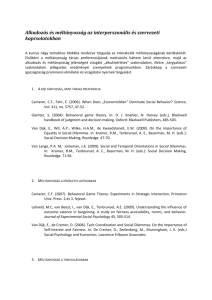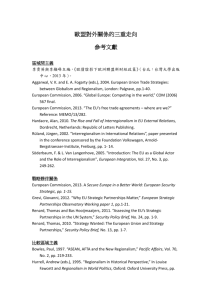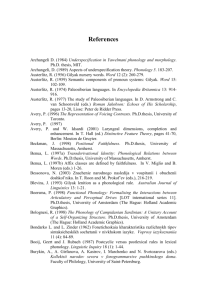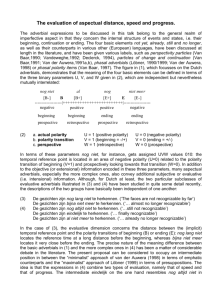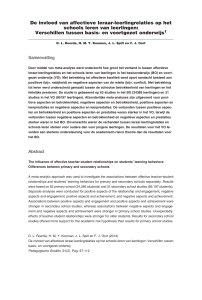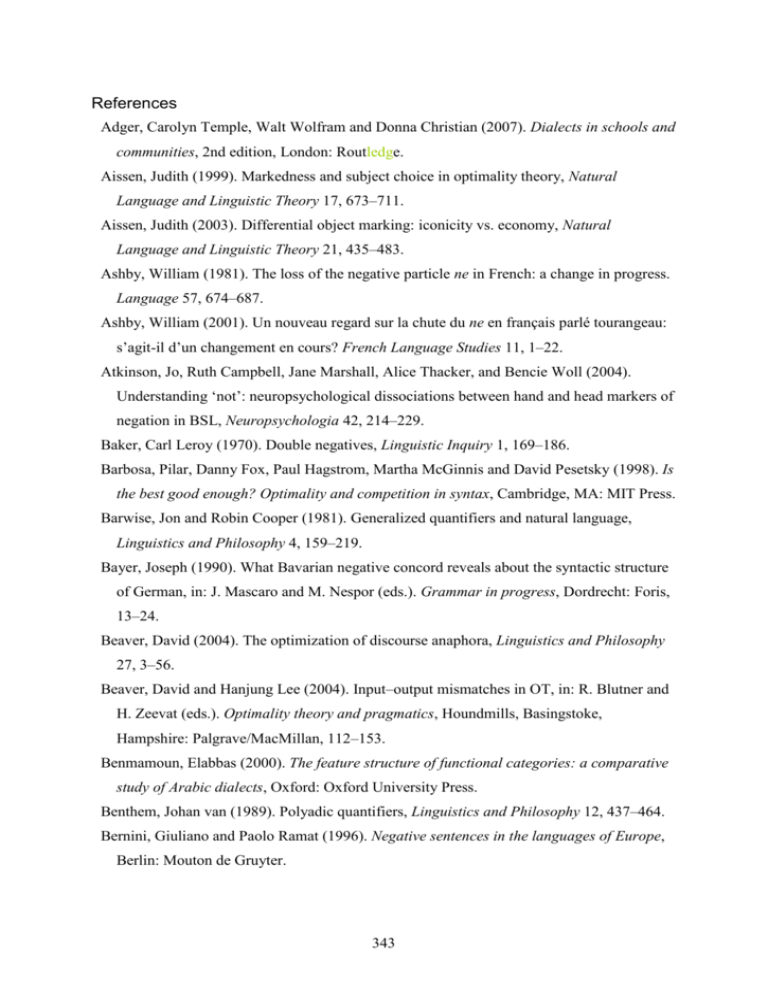
References
Adger, Carolyn Temple, Walt Wolfram and Donna Christian (2007). Dialects in schools and
communities, 2nd edition, London: Routledge.
Aissen, Judith (1999). Markedness and subject choice in optimality theory, Natural
Language and Linguistic Theory 17, 673–711.
Aissen, Judith (2003). Differential object marking: iconicity vs. economy, Natural
Language and Linguistic Theory 21, 435–483.
Ashby, William (1981). The loss of the negative particle ne in French: a change in progress.
Language 57, 674–687.
Ashby, William (2001). Un nouveau regard sur la chute du ne en français parlé tourangeau:
s’agit-il d’un changement en cours? French Language Studies 11, 1–22.
Atkinson, Jo, Ruth Campbell, Jane Marshall, Alice Thacker, and Bencie Woll (2004).
Understanding ‘not’: neuropsychological dissociations between hand and head markers of
negation in BSL, Neuropsychologia 42, 214–229.
Baker, Carl Leroy (1970). Double negatives, Linguistic Inquiry 1, 169–186.
Barbosa, Pilar, Danny Fox, Paul Hagstrom, Martha McGinnis and David Pesetsky (1998). Is
the best good enough? Optimality and competition in syntax, Cambridge, MA: MIT Press.
Barwise, Jon and Robin Cooper (1981). Generalized quantifiers and natural language,
Linguistics and Philosophy 4, 159–219.
Bayer, Joseph (1990). What Bavarian negative concord reveals about the syntactic structure
of German, in: J. Mascaro and M. Nespor (eds.). Grammar in progress, Dordrecht: Foris,
13–24.
Beaver, David (2004). The optimization of discourse anaphora, Linguistics and Philosophy
27, 3–56.
Beaver, David and Hanjung Lee (2004). Input–output mismatches in OT, in: R. Blutner and
H. Zeevat (eds.). Optimality theory and pragmatics, Houndmills, Basingstoke,
Hampshire: Palgrave/MacMillan, 112–153.
Benmamoun, Elabbas (2000). The feature structure of functional categories: a comparative
study of Arabic dialects, Oxford: Oxford University Press.
Benthem, Johan van (1989). Polyadic quantifiers, Linguistics and Philosophy 12, 437–464.
Bernini, Giuliano and Paolo Ramat (1996). Negative sentences in the languages of Europe,
Berlin: Mouton de Gruyter.
343
References
Besten, Hans den (1986). Double negation and the genesis of Afrikaans, in: P. Muysken and
N. Smith (eds.). Substrata versus universals in Creole languages, Amsterdam: John
Benjamins, 185–230.
Biberauer, Theresa (2006). Doubling vs. omission: insights from Afrikaans, Proceedings of
the workshop on syntactic doubling, Amsterdam: Meertens Instituut. Available at
http://www.meertens.knaw.nl/projecten/edisyn/Papers_workshop-on-Doubling.html.
Biberauer, Theresa (2007). Afrikaans negation and polarity: a comparative investigation of
the two nies, in: H. Zeijlstra and J.-P. Soehn (eds.). Proceedings of the workshop on
negation and polarity, Tübingen: Collaborative Research Center 441, 1–7. Available at
http://www.sfb441.uni-tuebingen.de/negpol/negpol07.pdf.
Blutner, Reinhard (1998). Lexical pragmatics, Journal of Semantics 15, 115–162.
Blutner, Reinhard (2000). Some aspects of optimality in natural language interpretation,
Journal of Semantics 17, 189–216.
Blutner, Reinhard (2004). Pragmatics and the lexicon, in: L. Horn and G. Ward (eds.).
Handbook of pragmatics, Oxford: Blackwell, 488–514.
Blutner, Reinhard and Henk Zeevat (eds.) (2003). Optimality theory and pragmatics.
Houndmills, Basingstoke, Hampshire: Palgrave Macmillan.
Blutner, Reinhard, Petra Hendriks and Helen de Hoop (2003). A new hypothesis on
compositionality, Proceedings of ICCS 2003, Sidney, 53–57.
Blutner, Reinhard, Petra Hendriks and Helen de Hoop (2006) Optimal communication,
Stanford, CA: CSLI Publications.
Boersma Paul (1998). Functional phonology, Ph.D. dissertation, University of Amsterdam.
Boersma, Paul and Bruce Hayes (2001). Empirical tests of the gradual learning algorithm,
Linguistic Inquiry 32, 45–86.
Borsley, Bob (1996). Modern phrase structure grammar, Oxford: Blackwell.
Borsley, Bob and Bob Morris Jones (2005). Welsh negation and grammatical theory,
Cardiff: University of Wales Press.
Bošković, Željko (2008). Licensing negative constituents and negative concord,
Proceedings of NELS 38.
Bosque, Ignacio (1980). Sobre la negácion, Madrid: Catedra.
Bréal, Michel (1897). Essai de Sémantique, Paris: Hachette.
Bréal, Michel (1900). Semantics, New York: Henry Holt & Co. Translation of Bréal (1897).
Breitbarth, Anne . A hybrid approach to Jespersen’s cycle in West-Germanic, The Journal of
Comparative Germanic Linguistics (to appear).
344
References
Breitbarth, Anne and Liliane Haegeman (2008). Not continuity, but change: stable stage II
in Jespersen’s cycle, M.S. University of Cambridge and Université de Lille III.
Bresnan, Joan, Shipra Dingare and Chris Manning (2001). Soft constraints mirror hard
constraints: voice and person in English and Lummi, Proceedings of the LFG 2001
conference, Hong Kong, Stanford, CA: CSLI Publications, 13–32.
Bresnan, Joan, Deo Ashwini and Dewani Sharma (2007a). Typology in variation: a
probabilistic approach to be and n’t in the Survey of English dialects, English language
and Linguistics 11, 301–346.
Bresnan, Joan, Anna Cueni, Tatiana Nikitina and Harald Baayen (2007b). Predicting the
dative alternation, in: G. Bouma, I. Krämer and J. Zwarts (eds.). Cognitive foundations of
interpretation, Amsterdam: Royal Dutch Academy of Sciences, 69–94.
Bresnan, Joan and Jennifer Hay (2007). Gradient grammar: an effect of animacy on the
syntax of give in varieties of English, Lingua (in press).
Chierchia, Gennaro (2006). Broaden your views: implicatures of domain widening and the
“logicality” of natural language, Linguistic Inquiry 37, 535–590.
Christensen, Susan (2003). Analysis of the standard French ne-drop phenomenon, M.S. .
Swarthmore College.
Clark, Brady (2004). A stochastic optimality theory approach to syntactic change, Ph.D.
dissertation, Stanford University.
Clarke, Charles C. (1904). The actual force of the French ne, Modern Philology 2, 279–287.
Corblin, Francis (1996). Multiple negation processing in natural language, Theoria 17, 214–
259.
Corblin, Francis and Ivan Derzhanski (1997). Multiple negation, optional arguments and the
reification of eventualities, in: F. Corblin, D. Godard, J.-M. Marandin (eds.). Empirical
issues in formal syntax and semantics. Selected papers from the Colloque de Syntaxe et de
Sémantique de Paris, Bern: Peter Lang, 219–243.
Corblin, Francis and Lucia Tovena (2003). L’expression de la négation dans les languages
romanes, in: D. Godard (ed.). Les langues romanes: problème de la phrase simple, Paris:
CNRS Editions, 279–342.
Corblin, Francis, Viviane Déprez, Henriëtte de Swart and Lucia Tovena (2004). Negative
concord, in: F. Corblin and H. de Swart (eds.). Handbook of French semantics, Stanford,
CA: CSLI Publications, 417–452.
Croft, Bill (1991). The evolution of negation, Journal of Linguistics 27, 1–27.
345
References
Cuervo, Cristina and Natalia Mazzaro (2008). Beyond negative concord: negative doubling
in a variety of Spanish, paper presented at the 2008 meeting of the Canadian Linguistics
Association.
Dahl, Östen (1979). Typology of sentence negation, Linguistics 17, 79–106.
Dalrymple, Mary, Makoto Kanazawa, Yookyung Kim, Sam Mchombo and Stanley Peters
(1998). Reciprocal expressions and the concept of reciprocity, Linguistics and Philosophy
21, 159–210.
Davidson, Lisa, Peter Jusczyk and Paul Smolensky (2006). Optimality in language
acquisition I: the initial and final states of the phonological grammar, in Smolensky and
Legendre (2006): chapter 17.
DeGraff, Michel (1997). Verb syntax in creolization (and beyond), in: L. Haegeman (ed.).
Elements of grammar, Dordrecht: Kluwer, 64–94.
Dekker, Paul and Robert van Rooy (2000). Bi-directional optimality theory; an application
of game theory, Journal of Semantics 17, 217–242.
Déprez, Viviane (1997a). Two Types of Negative Concord, Probus 9, 103–143.
Déprez, Viviane (1997b). A non-unified analysis of negative concord, in: D. Forget et al.
(eds.). Negation and polarity, Amsterdam: John Benjamins, 53–75.
Déprez, Viviane (1999). The roots of negative concord in French and French based creoles,
in: M. DeGraff (ed.). Language creation and language change, Cambridge, MA: MIT
Press, 329–375.
Déprez, Viviane (2000). Parallel (A)symmetries and the internal structure of negative
expressions, Natural Language and Linguistic Theory 18, 253–342.
Doetjes, Jenny (2005). The cameleontic nature of French ni: negative coordination in a
negative concord language, Proceedings of Sinn und Bedeutung 9, 72–86.
Dryer, Matthew (1988). Universal of negative position, in: M. Hammond, E. Moravcsik and
J. Wirth (eds.). Studies in syntactic typology, Amsterdam: John Benjamins, 93–124.
Dryer, Matthew (2007). Verb-object-negative order in Central Africa, in: N. Cyffer, E.
Ebermann and G. Ziegelmeyer (eds.). Negation patterns in West Africa, Amsterdam:
Benjamins (to appear).
Espinal, M. Teresa (1992). Expletive negation and logical absorption, Linguistic Review 9,
333–358.
Espinal, M. Teresa (1993). The interpretation of no-pas in Catalan, Journal of Pragmatics
19, 353–369.
346
References
Espinal, M. Teresa (2000). On the semantic status of n-words in Catalan and Spanish,
Lingua 110, 557–580.
Falaus, Anamaria (2007a). Le paradoxe de la double négation dans une langue à
concordance négative stricte, in: F. Floricic (ed.). La négation dans les langues romanes,
Amsterdam: Benjamins, 75–97.
Falaus, Anamaria (2007b). Negative concord and double negation: the Romanian puzzle, in:
J. Camacho et al. (eds.). Romance linguistics 2006, Amsterdam: John Benjamins, 135–
148.
Falaus, Anamaria (2008). Romanian n-words as negative quantifiers, University of
Pennsylvania working papers in linguistics, 14 (1), 119–134.
Farkas, Donka and Anastasia Giannakidou (1996). How clause-bound is the scope of
universals? Proceedings of SALT VI, Cornell, Ithaca: CLC Publications, 35–52.
Farkas, Donka and Henriëtte de Swart (2003). The semantics of incorporation. From
argument structure to discourse transparency, Stanford, CA: CSLI Publications.
Farkas, Donka and Henriëtte de Swart (2008). The semantics and pragmatics of plurals,
M.S. UCSC/Utrecht University.
Fauconnier, Gilles (1975). Pragmatic scales and logical structures, Linguistic Inquiry 6,
353–375.
Fauconnier, Gilles (1979). Implication reversal in a natural language, in: F. Günther and S.J.
Schmidt (eds.). Formal semantics and pragmatics for natural languages, Dordrecht:
Reidel, 289–301.
Von Fintel, Kai (1999). NPI-licensing, strawson entailment and context-dependency,
Journal of Semantics 16, 97–148.
Von Fintel, Kai and Lisa Matthewson (2008). Universals in semantics, The Linguistic
Review 25, 139–201.
Fitch, Tecumseh, Marc Hauser and Noam Chomsky (2005). The evolution of the language
faculty: clarifications and implications, Cognition 97, 179–210.
Franco, Jon and Alazne Landa 2006. Preverbal n-words and anti-agreement effects, in:
Sagarra, N. and Toribio, A.J. (eds.). Selected proceedings of the 9th Hispanic linguistics
symposium, Somerville, MA: Cascadilla Proceedings Project, 34–42.
Furukawa, Yukio (2007). Unembedded ‘negative’ quantifiers, in: T. Washio et al. (eds.).
New frontiers in artificial intelligence, Berlin: Springer, 232–245.
Gaatone, David (1971). Étude descriptive du système de la négation en français
contemporain (Publication romaines et françaises, CXIV), Genève: Librairie Droz.
347
References
Gass, Kate van (2007). Multiple n-words in Afrikaans, SPIL Plus 35, 167–186.
Gazdar, Gerald, Ewan H. Klein, Geoffrey K. Pullum and Ivan A. Sag (1985). Generalized
phrase structure grammar. Oxford: Blackwell/Cambridge, MA: Harvard University
Press.
Giannakidou, Anastasia (1997). The landscape of polarity items, unpublished Ph.D.
dissertation, Groningen University.
Giannakidou, Anastasia (1998). Polarity sensitivity as (non)veridical dependency,
Amsterdam: John Benjamins.
Giannakidou, Anastasia (1999). Affective dependencies, Linguistics and Philosophy 22,
367–421.
Giannakidou, Anastasia (2000). Negative…concord? Natural Language and Linguistic
Theory 18, 457–523.
Giannakidou, Anastasia (2006). N-words and negative concord, in: H. van Riemsdijk et al.
(eds.). The syntax companion, Oxford: Blackwell, 327–391.
Giannakidou, Anastasia (2007). The landscape of EVEN, Natural Language and Linguistic
Theory 25, 39–81.
Giannakidou, Anastasia (2008). Negative and positive polarity items: licensing,
compositionality and variation, in: C. Maienborn, K. von Heusinger and P. Portner (eds.).
Semantics: an international handbook of natural language, Berlin: Mouton de Gruyter (to
appear).
Givón, Talmy (1979). On understanding grammar, New York: Academic.
Godard, Danièle (2004). French negative dependency, in: F. Corblin and H. de Swart (eds.).
Handbook of French semantics, Stanford, CA: CSLI Publications, 351–390.
Greenberg, Joseph (1966). Language universals, with special reference to feature
hierarchies, The Hague: Mouton.
Grimshaw, Jane (1997). Projection, heads and optimality, Linguistic Inquiry 28, 373–422.
Groot, Casper de (1993). Hungarian, in: P. Kahrel and R. van den Berg (eds.). Typological
studies in negation, Amsterdam: Benjamins, 143–162.
Haegeman, Liliane (1995). The syntax of negation, Cambridge: Cambridge University Press.
Haegeman, Liliane (1997). The syntax of n-word and the Neg-criterion, in: D. Forget, P.
Hirschbühler, F. Martineau and M.L. Rivero (eds.). Negation and polarity, Amsterdam:
Benjamins, 115–137.
Haegeman, Liliane (2001). Antisymmetry and verb-final order in West Flemish, The journal
of Comparative Germanic Linguistics 3, 207–232.
348
References
Haegeman, Liliane (2002a). Some notion on DP-internal negative doubling, in: S. Barbiers
(ed.). Microvariation, Amsterdam: Meertens Instituut.
Haegeman, Liliane (2002b). West Flemish negation and the derivation of SOV order in
West Germanic, Nordic Journal of Linguistics, 25, 154–189.
Haegeman, Liliane (2003). Note on long adverbial fronting in English and the left periphery,
Linguistic Inquiry 34, 640–649.
Haegeman, Liliane and Raffaella Zanuttini (1996). Negative concord in West Flemish, in:
A. Belletti and L. Rizzi (eds.). Parameters and functional heads, Oxford: Oxford
University Press, 117–180.
Haegeman, Liliane and Terje Lohndal (2008). Negative concord and (multiple) agree: a case
study of West Flemish, M.S. Lille III/University of Maryland.
Haeseryn, W., K. Romijn, G. Geerts, R. de Rooij and M.C. van der Toorn (1997). Algemene
Nederlandse Spraakkunst, Groningen: Martinus Nijhoff.
Harries, Helga (1973) A note on double negation and modals as main verbs, Stanford
working papers on language universals 11, 211–217.
Haspelmath, Martin (1997). Indefinite pronouns, Oxford: Clarendon Press.
Haspelmath, Martin (2006). Against markedness (and what to replace it with), Journal of
Linguistics 42, 25–70.
Heinämäki, Orvokki (1978). Semantics of English temporal connectives, unpublished Ph.D.
dissertation, University of Texas, Austin.
Hendriks, Petra (2004a). Optimization in focus identification, in: R. Blutner and H. Zeevat
(eds.). Optimality theory and pragmatics. Palgrave Macmillan, 42–62.
Hendriks, Petra (2004b). Coherence relations, ellipsis and contrastive topics, Journal of
Semantics 21, 133–153.
Hendriks, Petra and Helen de Hoop (2001). Optimality theoretic semantics, Linguistics and
Philosophy 24, 1–32.
Hendriks, Petra and Jennifer Spenader (2005). Why be silent? Functions of ellipsis. In
Proceedings of the ESSLLI 2005 workshop on cross-modular approaches to ellipsis,
Edinburgh, 29–36.
Hendriks, Petra and Jennifer Spenader (2006). When production precedes comprehension:
an optimization approach to the acquisition of pronouns, Language and Acquisition 13,
319–348.
Hendriks, Petra, Helen de Hoop, Irene Krämer, Henriëtte de Swart, and Joost Zwarts (2009).
Conflicts in interpretation, London: Equinox (to appear).
349
References
Herburger, Elena (2001). The negative concord puzzle revisited, Natural Language
Semantics 9, 289–333.
Hoeksema, Jack (1994). On the grammaticalization of negative polarity items, Proceedings
of Berkeley Linguistic Society 20, 273–282.
Hoeksema, Jack (1997). Negation and negative concord in middle Dutch, in: D. Forget, P.
Hirschbühler, F. Martineau and M.-L. Rivero (eds.). Negation and polarity: syntax and
semantics, Amsterdam: John Benjamins, 139–158.
Hoeksema, Jack (2000). Negative polarity items: triggering, scope and c-command, in: L.R.
Horn and Y. Kato (eds.). Negation and polarity. Semantic and syntactic perspectives,
Oxford: Oxford University Press, 123–154.
Hoeksema, Jack (2002). Polarity-sensitive scalar particles in early modern and present-day
Dutch, Belgian Journal of Linguistics 16, 53–64.
Hoeksema, Jack (2005). In days, weeks, months, years, ages: a class of temporal negative
polarity items, in: D. Gilbers and P. Hendriks (eds.). Rejected papers: Feestbundel voor
Ron van Zonneveld. Groningen: Rijksuniversiteit Groningen.
Hoop, Helen de (2004). The problem of unintelligibility, in: A. ter Meulen and W. Abraham
(eds.). The composition of meaning. From lexeme to discourse. Amsterdam/Philadelphia:
John Benjamins, 69–81.
Hoop, Helen de and Henriëtte de Swart (2000). Adjunct clauses in optimality theory, Revista
di Linguistica/Italian Journal of Linguistics 12 (1), 107–127.
Horn, Laurence (1984). Towards a new taxonomy of pragmatic reference: Q-based and Rbased implicature, in: D. Schiffrin (ed.). Meaning, form, and use in context: linguistic
applications, Washington: Georgetown University Press, 11–42.
Horn, Laurence (1989). A natural history of negation, Chicago, IL: University of Chicago
Press. Reprinted (2001) with a new introduction, Stanford, CA: CSLI Publications.
Horn, Laurence (2001). The logic of logical double negation, in Y. Kato (ed.). Proceedings
of the Sophia symposium on negation, Tokio: Sophia University, 79–111.
Horst, Joop van der and Marijke van der Wal (1979). Negatieverschijnselen en
woordvolgorde in de geschiedenis van het Nederlands, Tijdschrift voor Nederlande Taal
en Letterkunde 95, 6–37.
Hoyt, Frederick (2006). Long distance negative concord and restructuring in Palestinian
Arabic, in: P. Dekker and H. Zeijlstra (eds.). Concord phenomena and the syntaxsemantics interface, Malaga: ESSLLI Publication, 27–32.
350
References
Isac, Daniela (2004). Focus on negative concord, in: R. Bok-Bennema et al. (eds.). Selected
papers from Romance languages and linguistic theory 2002, Amsterdam: John
Benjamins, 119–140.
Israel, Michael (1996). Polarity sensitivity as lexical semantics, Linguistics and Philosophy
19, 619–666.
Itô, Junko and Armin Mester (1995). Japanese phonology, in: J.A. Goldsmith (ed.).
Handbook of phonological theory, Oxford: Blackwell, 817–838.
Itô, Junko and Armin Mester (1999). The phonological lexicon, in: N. Tsujimura (ed.).
Handbook of Japanese linguistics, Oxford: Blackwell, 62–100.
Jacobs, Joachim (1991). Negation, in: A. von Stechow and D. Wunderlich (eds.). Semantik.
Ein internationales Handbuch der zeitgenössigen Forschung, Berlin: Mouton, 560–596.
Jäger, Agnes (2005). Negation in Old High German, Zeitschrift für Sprachwissenschaft 24,
227–262.
Jäger, Agnes (2008). History of German negation, Amsterdam: John Benjamins.
Jäger, Gerhard (2003). Learning constraint sub-hierarchies, in: R. Blutner and H. Zeevat
(eds.). Pragmatics and optimality theory, Houndmills: Palgrave MacMillan, 251–287.
Jäger, Gerhard (2007). Evolutionary game theory and typology. A case study, Language 83,
74–109.
Jäger, Gerhard and Annette Rosenbach (2006). The winner takes it all – almost.
Cumulativity in grammatical variation, Linguistics 44, 937–971.
Jäger, Gerhard and Robert van Rooy (2007). Language structure: psychological and social
constraints, Synthese 159, 99–130.
Jakobson, Roman (1932). Zur Struktur des russischen Verbums, in: Charistera Guglielmo
Mathesio, Prague, 74–84 (also in Selected Writings II).
Jakobson, Roman (1939). Signe zéro, in: Mélanges de linguistique offerts à Charles Bally,
Genève (also in Selected writings II).
Jakobson, Roman (1962). Selected writings I. Phonological studies, the Hague: Mouton.
Jakobson, Roman (1971). Selected writings II. Word and language, the Hague: Mouton.
Jespersen, Otto (1917). Negation in English and other languages, Copenhagen: A.F. Høst.
Reprinted in: Selected writings of Otto Jespersen (1962), London: George Allen &
Unwin, 3–151.
Jespersen, Otto (1924). The philosophy of grammar, London: George Allen & Urwin.
Jespersen, Otto (1933). Essentials of English grammar, reprinted 1964, Tuscaloosa, AL:
University of Alabama Press.
351
References
Kadmon, Nirit and Fred Landman (1993). Any, Linguistics and Philosophy 16, 353–422.
Kager, René (1999). Optimality theory, Cambridge: Cambridge University Press.
Kaiser, Elsi (2006). Negation and the left periphery in Finnish, Lingua 116, 314–350.
Kayne, Richard (1984). Connectedness and binary branching, Dordrecht: Foris.
Keenan, Ed (1987). Unreducible n-ary quantifiers in natural language, in: P. Gärdenfors
(ed.). Generalized quantifiers, Dordrecht: Reidel, 109–151.
Keenan, Ed and Dag Westerståhl (1997). Generalized quantifiers in linguistics and logic, in:
J. van Benthem and A. ter Meulen (eds.). Handbook of logic and language, Amsterdam:
Elsevier, 837–893.
Kirby, Simon and Jim Hurford (1997). The evolution of incremental learning: language,
development and critical periods, Technical report, Language Evolution and Computation
Research Unit, University of Edinburgh.
Klima, Edward (1964). Negation in English, in: J. Fodor and J. Katz (eds.). The structure of
language, Englewoord Cliffs, NJ: Prentice Hall, 246–323.
Koontz-Garboden, Andrew (2004). Language contact and Spanish aspectual expression: a
formal analysis, Lingua 114, 1291–1330.
Krifka, Manfred (1995). The semantics and pragmatics of polarity items, Linguistic Analysis
25, 209–257.
Krifka, Manfred (2001). Quantifying into question acts, Natural Language Semantics 9, 1–
40.
Krifka, Manfred (2003). Quantifiers in question, Korean Journal of English Language and
Linguistics 3, 499–526.
Labov, William (1972). Negative attraction and negative concord in English grammar,
Language 48, 773–818.
Ladusaw, William (1979). Polarity sensitivity as inherent scope relations, Ph.D.
Dissertation. University of Texas, New York: Garland Press.
Ladusaw, William (1992). Expressing negation, Proceedings of SALT 2, Columbus, OH:
Ohio State University, 237–259.
Ladusaw, William (1996). Negation and polarity items, in: S. Lappin (ed.). The handbook of
contemporary semantic theory, Oxford: Blackwell, 321–341.
Ladusaw, William (2004). Framing the issues: the biasing effect of polarity items in
questions, M.S. UCSC.
Lahiri, Utpal (1995). Negative polarity items in Hindi, Proceedings of SALT V, Ithaca, NY:
Cornell University Press.
352
References
Lahiri, Utpal (1998). Focus and negative polarity in Hindi, Natural Language Semantics 6,
57–123.
Laka, Itziar (1990). Negation in syntax: on the nature of functional categories and
projections, Ph.D. dissertation, Cambridge, MA: MIT Press.
Lascarides, Alex and Nicholas Asher (1993). Temporal interpretation, discourse relations
and commonsense entailment, Linguistics and Philosophy 16, 437–493.
Legendre, Géraldine (2001). Masked second-position effects and the linearization of
functional features, in: G. Legendre, J. Grimshaw and S. Vikner (eds.). Optimalitytheoretic syntax, Cambridge, MA: MIT Press, 241–277.
Legendre, Géraldine, Paul Hagstrom, Anna Vainikka and Marina Todorova (2002). Partial
constraint ordering in child French syntax, Language Acquisition 10, 189–227.
Levinson, Stephen (2000). Presumptive meanings. Cambridge, MA: MIT Press.
Linebarger, Marcia (1980). The grammar of negative polarity, Ph.D. thesis, Cambridge,
MA: MIT Press.
Linebarger, Marcia (1987). Negative polarity and grammatical representation, Linguistics
and Philosophy 10, 325–387.
Manning, Chris, Ivan Sag and Masayo Iida (1999). The lexical integrity of Japanese
causatives, Nordic Journal of Linguistics 21, 107–144.
Martineau, France and Viviane Déprez (2004). Micro-parametric variation and negative
concord, in: J. Auger, J.C. Clements and B. Vance (eds.). Contemporary approaches to
Romance linguistics, Amsterdam: Benjamins, 139–158.
Martins, Ana Maria (2006). Emphatic affirmation and polarity: contrasting European
Portuguese with Brazilian Portuguese, Spanish, Catalan and Galician, in: J. Doetjes and P.
Gonzalez (eds.). Romance languages and linguistic theory 2004. Selected papers from
‘Going Romance’, Leiden, 9–11 December 2004; Amsterdam: Benjamins, 197–223.
Mattausch, Jason (2005). On the optimization and grammaticalization of anaphora, Ph.D.
dissertation, Humboldt University Berlin, published as ZAS Papers in Linguistics 38.
Mattausch, Jason (2007). Optimality, bidirectionality and the evolution of binding
phenomena, Research on Language and Computation 5, 103–131.
May, Robert (1989). Interpreting logical form, Linguistics and Philosophy 12, 387–435.
Mazzon, Gabriella (2004). A history of English negation, Harlow: Pearson Longman.
McCarthy, John (2002). Optimality theory in phonology, Oxford: Blackwell.
McCarthy, John and Alan Prince (1994). Prosodic morphology, in: J. Goldsmith (ed.). A
handbook of phonological theory, Oxford: Blackwell, 318–366.
353
References
Merchant, Jason (2001). The syntax of silence: sluicing, islands and the theory of ellipsis,
Oxford: Oxford University Press.
Mitchell, Erika (2006). The morpho-syntax of negation and the positions of NegP in the
Finno-Ugric languages, Lingua 116, 228–244.
Moltmann, Friederike (1995). Exception sentences and polyadic quantification, Linguistics
and Philosophy 18, 223–280.
Morimoto, Yukiko (2001). Deriving the directionality parameter in OT-LFG, in: M. Butt
and T. King (eds.). Proceedings of the LFG01 conference, Stanford, CA: CSLI
Publications. Available at http://cslipublications.stanford.edu/LFG/5/lfg00.html.
Muller, Claude (1991). La négation en français, Genève: Droz.
Newson, Mark (1998). On the nature of inputs and outputs. A case study of negation, in: P.
Barbosa et al. (eds.). Is the best good enough? Optimality and competition in syntax,
Camrbidge, MA: Cambridge University Press, 315–336.
Ouali, Hamid (2003). Sentential negation in Berber: a comparative study, in: J. Mugany
(ed.). Linguistic description. Typology and representation of African languages, Trenton:
Africa World Press, 243–256.
Ouali, Hamid (2005). Negation and negative polarity items in Berber, BLS 13, Berkeley,
CA: Berkeley Linguistic Society, 330–340.
Payne, John (1985). Negation, in: T. Shopen (ed.) Language typology and syntactic
description I: clause structure, Cambridge: Cambridge University Press.
Penka, Doris (2006). A cross-linguistic perspective on n-words, in: Proceedings of BIDE05,
International Journal of Basque Linguistics and Philology.
Penka, Doris (2007). Negative indefinites, Ph.D. dissertation, Karl-Eberhads Universität
Tübingen.
Pollock, Jean-Yves (1989). Verb movement, universal grammar and the structure of IP,
Linguistic Inquiry 20, 365–424.
Ponelis, Fritz (1985). Afrikaans sintaksis, 2nd edition, Pretoria: J.L. van Schaik.
Portner, Paul and Raffaella Zanuttini (2000). The force of negation in Wh exclamatives and
interrogatives, in: L. Horn and Y. Kato (eds.). Studies in negation and polarity, Oxford:
Oxford University Press, 193–231.
Portner, Paul and Raffaella Zanuttini (2003). Exclamative clauses: at the syntax–semantic
interface, Language 79, 39–81.
354
References
Posner, Rebecca (1984). Double negatives, negative polarity and negative incorporation in
Romance: a historical and comparative view, Transactions of the Philological Society
1984, 1–26.
Posner, Rebecca (1985). Post-verbal negation in non-standard French: a historical and
comparative view, Romance Philology 39, 170–197.
Postal, Paul (2000). The SQUAT lectures, M.S. New York University.
Postal, Paul (2004). A remark on English double negatives, in: E. Laporte et al. (eds.).
Syntaxe, lexique, et lexique-grammaire, Amsterdam: Benjamins, 497–508.
Postal, Paul (2005). Suppose (if only for an hour) that NPIs are negation-containing phrases,
M.S. New York University.
Postma, Gert-Jan (2002). De enkelvoudige clitische negatie in het Middelnederlands en de
Jespersen cyclus, Nederlandse Taalkunde 7, 44–87.
Prince, Alan and Paul Smolensky (1997). Optimality: from neural networks to universal
grammar. Science 275, 1604–1610.
Prince, Alan and Paul Smolensky (1993/2004) Optimality theory: constraint interaction in
generative grammar, appeared as Technical Report CU-CS-696-93, Department of
Computer Science, University of Colorado at Boulder, and Technical Report TR-2,
Rutgers Center for Cognitive Science, Rutgers University, New Brunswick, NJ, April
1993, published 2004 by Blackwell.
Progovac, Ljiljana (1993). Negative polarity: entailment and binding, Linguistics and
Philosophy 16, 149–180.
Progovac, Ljiljana (1994). Negative and positive polarity, Cambridge: Cambridge
University Press.
Przepiórkowski, Adam and Anna Kupść (1999). Eventuality negation and negative concord
in Polish and Italian, in: B. Borsley and A. Przepiorkówski (eds.). Slavic in HPSG,
Stanford, CA: CSLI Publications, 211–246.
Puskás, Genoveva (2002). On negative licensing contexts and the role of n-words, in: I.
Kenesei et al. (eds.). Approaches to Hungarian, vol. 8, Budapest: Akadémiaio Kiadó, 81–
106.
Puskás, Genoveva (2006). Negation in Finno-Ugric: an introduction, Lingua 116, 203–227.
Quirk, Randolph, Sidney Greenbaum, Geoffrey Leech and Jan Svartvik (1985). A
comprehensive grammar of the English language, London: Longman.
355
References
Richter, Frank and Manfred Sailer (2004). Polish negation and lexical resource semantics,
in: L.S. Moss and R.T. Oehrle (eds.). Electronic notes in theoretical computer science,
vol. 53, Amsterdam: Elsevier, 309–321.
Richter, Frank and Manfred Sailer (2006). Modeling typological markedness in semantics,
in S. Müller (ed.). Proceedings of the 13th international conference on HPSG, Stanford,
CA: CSLI Publications, 305–325.
Rizzi, Luigi (1997). The fine structure of the left periphery, in: L. Haegeman (ed.). Elements
of grammar, Dordrecht: Kluwer, 281–337.
Rooth, Math (1985). Association with focus, Ph.D. dissertation, University of Massachusetts
at Amherst.
Rooy, Robert van (2004). Signalling games select Horn strategies, Linguistics and
Philosophy 27, 493–527.
Rowlett, Paul (1998). Sentential negation in French, Oxford: Oxford University Press.
Rullmann, Hotze (2003). Additive particles and polarity, Journal of Semantics 20, 329–401.
Rullman, Hotze and Jack Hoeksema (2001). Scalarity and polarity: a study of scalar adverbs
as polarity items, in: J. Hoeksema, H. Rullmann, V. Sanchez-Valencia and T. van der
Wouden (eds.). Perspectives on negation and polarity items, Amsterdam: John
Benjamins, 129–171.
Sag, Ivan, Thomas Wasow and Emily Bender (2003). Syntactic theory: a formal
introduction, Stanford, CA: CSLI Publications.
Sankoff, Gillian and Dianne Vincent (1977). L’emploi productif du ne dans le français parlé
à Montréal, Le français moderne 45, 243–256.
Schwenter, Scott (2005). The pragmatics of negation in Brazilian Portuguese, Lingua 115,
1427–1456.
Schwenter, Scott (2006). Fine-tuning Jespersen’s cycle, in: B.J. Birner and G. Ward (eds.).
Drawing the boundaries of meaning: neo-Gricean studies in pragmatics and semantics in
honor of Laurence R. Horn, Amsterdam: Benjamins.
Sells, Peter (2000). Negation in Swedish: where it’s not at, in: M. Butt and T.H. King (eds.).
Proceedings of the LFG-00 conference, Stanford, CA: CSLI Publications. Available at
http://cslipublications.stanford.edu/LFG/5/lfg00.html.
Sells, Peter (2001). Structure, alignment and optimality in Swedish, Stanford, CA: CSLI
Publications.
356
References
Smolensky, Paul and Géraldine Legendre (2006). The harmonic mind: from neutral
computation to optimality-theoretic grammar. Vol 1: cognitive architecture; Vol 2:
linguistic and philosophical implications. Cambridge, MA: MIT Press.
Stump, Gregory (1989). Further remarks on Breton agreement, Natural Language and
Linguistic theory 7, 429–471.
Stvan, Laurel (1998). The semantics and pragmatics of bare singular noun phrases. Ph.D.
dissertation, Northwestern University.
Surányi, Balázs (2006a). Predicates, negative quantifiers and focus: specificity and
quantificationality of n-words, in: K. É Kiss (ed.). Event structure and the left periphery,
Dordrecht: Springer.
Surányi, Balázs (2006b). Quantification and focus in negative concord, Lingua 116, 272–
313.
Swart, Henriëtte de (1996). Meaning and use of not..until, Journal of Semantics 13, 221–
263.
Swart, Henriëtte de (1998a). Introduction to natural language semantics, Stanford, CA:
CSLI Publications.
Swart, Henriëtte de (1998b). Licensing of negative polarity items under inverse scope,
Lingua 105, 175–200.
Swart, Henriëtte de (1999). Position and meaning: time adverbials in context, in: P. Bosch
and R. van der Sandt (eds.). Focus: linguistic, cognitive and computational perspectives,
Cambridge: Cambridge University Press, 336–361.
Swart, Henriëtte de (2000). Scope ambiguities with negative quantifiers, in: K. von
Heusinger and U. Egli (eds.). Reference and anaphoric relations, Dordrecht: Kluwer,
118–142.
Swart, Henriëtte de (2001a). Weak readings of indefinites: type-shifting and closure, The
Linguistic Review 18, 69–96.
Swart, Henriëtte de (2001b). Négation et coordination: la conjonction ni, in: R. BokBennema, B. de Jonge, B. Kampers-Manhe and A. Molendijk (eds.). Adverbial
modification, Amsterdam: Rodopi, 109–124.
Swart, Henriëtte de (2006). Marking and interpretation of negation: a bi-directional OT
approach, in: R. Zanuttini, H. Campos, E. Herburger and P. Portner (eds.). Negation,
tense and clausal architecture: cross-linguistic investigations, Washington: Georgetown
University Press, 199–218.
357
References
Swart, Henriëtte de (2009). Negation in early L2: a window on language genesis, in: R.
Botha and H. de Swart (eds.). Language evolution: the view from restricted linguistic
systems, Utrecht: LOT Publications, 59–100
Swart, Henriëtte de and Arie Molendijk (1999). Negation and the temporal structure of
narrative discourse, Journal of Semantics 16, 1–42.
Swart, Henriëtte de and Ivan Sag (2002). Negation and negative concord in Romance,
Linguistics and Philosophy 25, 373–417.
Swart, Henriëtte de and Joost Zwarts (2007). Less form, more meaning: why bare nominals
are special, Lingua (to appear).
Szabolcsi, Anna (1997). Strategies for scope taking, in: A. Szabolcsi (ed.). Ways of scope
taking, Dordrecht: Kluwer, 109–155.
Szabolcsi, Anna (2004). Positive polarity – negative polarity, Natural Language and
Linguistic theory 22, 409–452.
Szabolcsi, Anna and Bill Haddican (2004). Conjunction meets negation: a study in crosslinguistic variation, Journal of Semantics 21, 219–249.
Tanaka, Shin (1994). Die Mehrfachnegation: ein Sprachgut der Unraffinierten?, in: D.
Halwachs and I. Stütz (eds.). Sprache—Sprechen—Handeln: Akten des 28 Linguistischen
Kolloquiums, Graz 1993, Tübingen: Niemeyer, 191–198.
Tesar, Bruce and Paul Smolensky (1993). The learnability of optimality theory: an
algorithm and some basic complexity results. Technical Report CU-CS-678-93, Computer
Science Department, University of Colorado at Boulder.
Tesar, Bruce and Paul Smolensky (1998). Learnability in optimality theory, Linguistic
Inquiry 29, 229–268.
Tesar, Bruce and Paul Smolensky (2000). Learnability in optimality theory, Cambridge,
MA: MIT Press.
Tesnière, Lucien (1959). Eléments de syntaxe structurale, Paris: Klincksieck.
Thomson, Hanne-Ruth (2006). Negation patterns in Bengali, Bulletin of SOAS 69, 243–265.
Tomasello, Michael and Josep Call (1997). Primate cognition, Oxford: Oxford University
Press.
Tóth, Ildiko (1999). Negative polarity item licensing in Hungarian, Acta Linguistica
Hungarica 46, 119–142.
Tovena, Lucia (1998). The fine structure of polarity, New York: Garland.
358
References
Tovena, Lucia, Viviane Déprez and Jacques Jayez (2004). Polarity sensitive items, in: F.
Corblin and H. de Swart (eds.). Handbook of French semantics, Stanford, CA: CSLI
Publications, 391–415.
Trubetzkoy, Nikolaj (1931). Die phonologische Systeme, Travaux du cercle linguistique de
Prague 4, 96–116.
Trubetzkoy, Nikolaj (1939). Grundzüge der Phonologie, Göttingen: Vandenhoeck and
Ruprecht.
Tubau, Susagna (2008). Negative concord in English and Romance: syntax–morphology
interface conditions on the expression of negation, Ph.D. dissertation, University of
Amsterdam.
Uribe-Etxebarria, Miriam (1994). Interface licensing conditions on negative polarity items:
a theory of polarity and tense interactions, Ph.D. thesis, University of Connecticut.
Vallduví, Enric (1994). Polarity items, n-words and minimizers in Catalan and Spanish,
Probus 6, 263–294.
Van der Auwera, Johan and Annemarie Neuckermans (2004). Jespersen’s cycle and the
interaction of predicate and quantifier negation, in: B. Kortmann (ed.). Dialectology meets
typology. Dialect grammar from a cross-linguistic perspective, Berlin: Mouton de
Gruyter, 453–478.
Van der Auwera, Johan and Gunther de Vogelaer (2008). Negatie en kwantificatie, in: S.
Barbiers, J.van der Auwera, E. Boef, H. Bennis, G. de Vogelaer and M. van der Ham
(eds.). Syntactische atlas van de Nederlandse dialecten, dl. II, Amsterdam: Amsterdam
University Press.
Vasishth, Shravan (2000). Word order, negation and negative polarity in Hindi, OSU
Working Papers in Linguistics 53, 108–131.
Vasishth, Shravan (2002). Word order, negation and negative polarity in Hindi, Journal of
Language and Computation 3.
Vincent, Nigel Vincent (1999). Competition and correspondence in syntactic change: null
arguments in Latin and Romance, in: S. Pintzuk, G. Tsoulas and A. Warner (eds.).
Diachronic syntax: models and mechanisms, Oxford: Oxford University Press, 25–50.
Vinet, Marie-Thérèse (1998). Contrastive focus, French n-words and variation, Canadian
Journal of Linguistics 431, 121–143.
Vlachou, Evangelia (2007). Freedom of choice in and out of context. The semantics of
French, Greek and English free choice items, Ph.D. dissertation, Utrecht University.
359
References
Waher, Hester (1978). Die problem van die bereik van die ontkenning met spesiale
verwysing na Afrikaans, Ph.D. dissertation, Kaapstad.
Wallage, Phillip (2005). Negation in Early English: parametrization and grammatical
competition, Ph.D. thesis, University of York.
Wallage, Phillip (2008). Jespersen’s cycle in Middle English: parametric variation and
grammatical competition, Lingua 118, 643–674.
Watanabe, Akira (2004). The genesis of negative concord: syntax and morphology of
negative doubling, Linguistic Inquiry 35, 559–612.
Weiss, Helmut (2002). Three types of negation: a case study in Bavarian, in: S. Barbiers et
al. (eds.). Syntactic microvariation, Amsterdam: Meertens Instituut, 305–332.
Wheeler, Max, Alan Yates, Nicolau Dols (1999). Catalan: a comprehensive grammar,
London: Routledge.
Wilson, Colin (2001). Bidirectional optimization and the theory of anaphora, in: G.
Legendre, J. Grimshaw and S. Vikner (eds.). Optimality-theoretic syntax, Cambridge,
MA: MIT Press, 465–507.
Winter, Yoad and Joost Zwarts (2000). A semantic characterization of locative PPs. In
Proceedings of semantics and linguistic theory (SALT) 7.
Wouden, Ton van der (1994). Negative contexts. Ph.D. dissertation, University of
Groningen.
Wouden, Ton van der (1997). Negative contexts: collocation, polarity and multiple
negation, London: Routledge.
Wouden, Ton van der and Frans Zwarts (1993). A semantic analysis of negative concord,
Proceedings of SALT, III, 202–219.
Xiao, Richard and Anthony McEnery (2008). Negation in Chinese: a corpus-based study,
Journal of Chinese linguistics 36: 274–330.
Zanuttini, Raffaella (1991). Syntactic properties of sentential negation: a comparative study
of Romance languages, unpublished Ph.D. dissertation, University of Pennsylvania.
Zanuttini, Raffaella (1994). Reexamining negative clauses, in: G. Cinque et al. (eds.). Paths
towards universal grammar. Studies in honor of Richard S. Kayne, Washington,
Georgetown University Press, 427–451.
Zanuttini, Raffaella (1996). Negation and clausal structure: a comparative study of
Romance languages, Oxford: Oxford University Press.
Zeevat, Henk (2000). The asymmetry of optimality theoretic syntax and semantics, Journal
of Semantics 17, 243–262.
360
References
Zeevat, Henk (2006). Freezing and marking, Linguistics 44, 1095–1112.
Zeevat, Henk and Gerhard Jäger (2002). A reinterpretation of syntactic alignment, in: D. de
Jongh, H. Zeevat and M. Nilsenova (eds.). Proceedings of the 3rd and 4th international
symposium on language, logic and computation, Amsterdam: ILLC.
Zeijlstra, Hedde (2004). Sentential Negation and Negative concord, Ph.D. thesis, Utrecht:
LOT Dissertation Series.
Zeijlstra, Hedde (2007). Emphatic multiple negative expressions in Dutch, Amsterdam:
ACLC working papers and lingBuzz/000344.
Zwarts, Frans (1986). Categoriale grammatica en algebraïsche semantiek: een studie naar
negatie en polariteit in het Nederlands, Ph.D. dissertation, Groningen University.
Zwarts, Frans (1995). Non-veridical contexts, Linguistic Analysis 25, 286–312.
Zwarts, Frans (1998). Three types of polarity, in: F. Hamm and E. Hinrichs (eds.). Plurality
and quantification, Dordrecht: Kluwer, 177–238.
Zwarts, Joost (2003). Paths round a prototype, in: P. Saint-Dizier, (ed.). ACL-SIGSEM
workshop: the linguistic dimensions of prepositions and their use in computational
formalisms and applications, Toulouse: IRIT, 228–238.
Zwarts, Joost (2004). Competition between word meanings: the polysemy of (a)round, in: C.
Meier and M. Weisgerber (eds.). Proceedings of SuB8. Konstanz: University of Konstanz
Linguistics Working Papers, 349–360.
361

